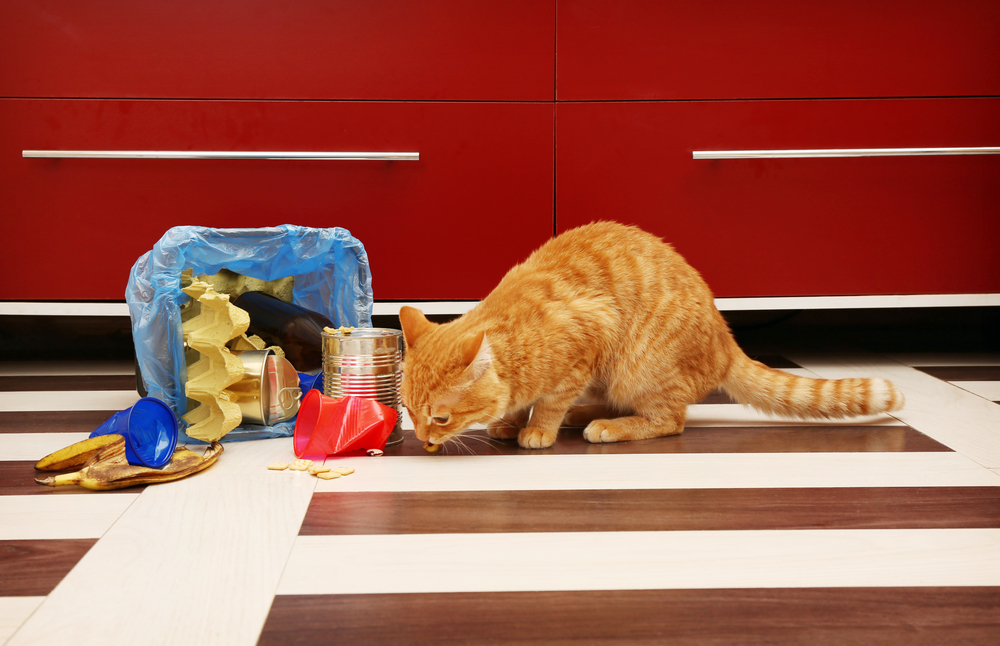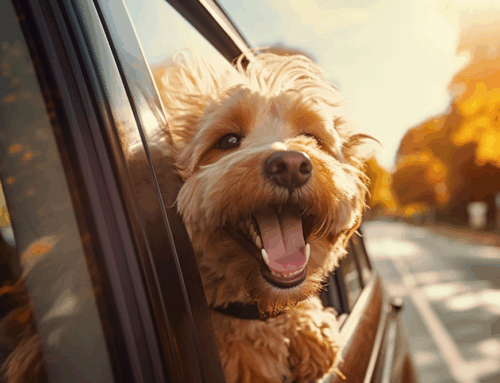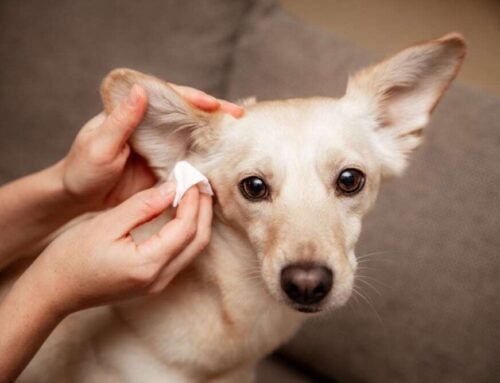Living with a pet has many benefits, but our four-legged family members, especially puppies and kittens, tend to get into everything, which can lead to mayhem and potentially dangerous situations. Our Animal Medical Hospital of Naples team knows you want to protect your pet, and we offer tips to pet-proof your home to help prevent accidents.
Pet-proof your kitchen
Many human foods are toxic to pets, and human medications, which are dangerous for pets, are often kept in the kitchen. Tips include:
- Keep your counters clean — Don’t leave food on your counters. This helps prevent counter surfing and also ensures your pet doesn’t get into toxic foods, such as chocolate, raisins, and xylitol. In addition, this protects your pet from ingesting packaging that can cause a foreign body obstruction.
- Store garbage in sealed containers — Dumpster diving can lead to gastrointestinal (GI) upset, foreign body obstruction, and more dangerous issues if a toxic substance is ingested. Keep your garbage in sealed containers or inside a secure closet or cabinet.
- Secure your medications — Place all medications on high shelves inside a latched cabinet.
- Use childproof latches — Place childproof latches on your cabinets to ensure your pet can’t gain access.
- Install baby gates — Install baby gates to prevent access to the kitchen.
Pet-proof your family room
Your pet is a valued family member, and you want to keep them safe in your family room. Tips include:
- Cover cords — Many pets like to chew cords, which can be dangerous. Use cord covers to contain wires, and unplug cords when not in use.
- Be tidy — Children’s toys and small game pieces can be ingested, causing a GI obstruction. Put all toys and games away in bins with lids when not in use.
- Limit your decor — Cats especially love to knock over knick-knacks. Ensure items on shelves are not breakable to help prevent accidents.
- Research your houseplants — Ensure the plants in your home are pet-safe, since many, such as lilies, tulips, and dieffenbachia, are toxic to pets.
- Secure the fireplace — Block off fireplace access with a baby gate or fire screen.
- Monitor the recliner — Cats and small dogs can get inside a reclining chair and be injured when the chair closes. Never leave recliners open when not in use.
Pet-proof your bathroom
If you keep your medications in your bathroom, ensure the cabinet is secure. Other tips include:
- Keep the lid closed — Small pets can fall in the toilet and potentially drown, and larger pets may drink toilet water that contains harmful bacteria or cleaning chemicals. Keep the toilet lid closed, and consider installing a seat lock.
- Secure the trash — Items commonly used in the bathroom, such as dental floss, can cause serious problems if ingested by your pet. Keep your trash in a latched cabinet or a pet-proof container.
- Tidy the bath — Your pet may be intrigued by bath toys or loofah sponges. Store these items between bathtimes.
- Consider your hair appliances — Never leave a hot curling iron unattended, and unplug and store curling irons and hair dryers when not in use.
- Protect your toilet paper — Many pets love to play with toilet paper, which may not be dangerous, but can cause a mess. Keep your toilet paper in containers or use a roll protector.
Pet-proof your laundry room
Laundry rooms can pose many dangers for pets. Tips include:
- Keep household products secure — Place all cleaning supplies, chemicals, and laundry supplies, including dryer sheets, on high shelves in a latched cabinet.
- Close the doors — Keep the washer and dryer doors closed at all times, and check the bins before every use.
- Tidy the laundry bin — Clothing items such as socks are commonly ingested by curious pets. Ensure all laundry items are in their designated bins.
Pet-proof your bedroom
Bedrooms are commonly used as a safe zone for pets, but you must take precautions to ensure the area is safe. Tips include:
- Secure clothing — Keep clothes and shoes behind closed doors, because shoe laces, drawstrings, and buttons can cause a GI obstruction, if ingested.
- Look under the bed — Check under the bed for clothing or small objects that may interest your pet.
- Store your lotion — Store your cosmetics and lotions in latched drawers.
- Keep doors closed — Keep closet doors and dresser drawers closed, first ensuring your pet does not get accidentally closed inside.
- Store your jewelry — Keep jewelry, small accessories, and hair bands in latched drawers or on high shelves.
- Avoid moth balls — Don’t use moth balls, which are toxic to pets.
Pet-proof your yard

A fenced yard is a great place for your pet to exercise, but the area must be safe. Tips include:
- Prevent escape — Look for holes in the fence, loose posts, and unlatched gates to ensure your pet doesn’t go missing.
- Check your plants — Ensure plants in your yard are pet-safe.
- Be aware of toxins — Many fertilizers, pesticides, and rodenticides are extremely toxic to pets. If you use any of these products, ensure your pet cannot access them.
- Monitor your pet — Monitor your pet at all times around the swimming pool to prevent drowning.
These tips should help ensure that your home is safe for your pet. However, if your pet still manages to ingest a toxin or foreign body, contact our team at Animal Medical Hospital of Naples, so we can provide the care they need.






Leave A Comment